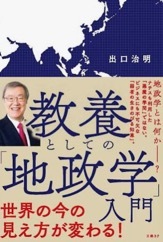「教養としての地政学入門」出口治明 "Introduction to Geopolitics as an Education" Haruaki Deguchi [Impression]
 私がコンプレックスを持っている「教養」という言葉と、最近よく目にする「地政学」が組み合わさっているタイトルに惹かれて読んでみた。
私がコンプレックスを持っている「教養」という言葉と、最近よく目にする「地政学」が組み合わさっているタイトルに惹かれて読んでみた。著者は、元ライフネット生命会長で、現在は立命館アジア太平洋大学学長。
これまで1万冊以上の本を読む読書家でもある。そして、世界の1200以上の都市を訪れている旅人でもある。
私の読書ペースで換算すると、150歳まで生きないと無理な1万冊というレベル。
さらに宝くじを当てて仕事を辞めても、1200都市を訪れるのはまず無理そうだと思いながら、読み進んだ。
全体の構成は、「地政学とは?」、「陸の地政学とは?」、「海の地政学とは?」、「日本の地政学とは?」、「地政学の二冊の古典について」という5章立てになっている。
「国は引越しできない」という前提のもと、古代から近代までの歴史のかなり詳細な部分まで切り込んでいるので、とても勉強にはなる。
個人的には、少しマニアックすぎると感じた部分もあるが、何点か気づかされた点があったことは嬉しかった。
例えば、大英帝国(著者はイギリスとは言わない)とEU諸国との感覚の違い、アメリカ、ニューヨークの以前の地名、南米で何故ブラジルだけがポルトガル語なのかなど。
そして、日本の江戸時代の鎖国は良くなかったという意見にも目を見開かされた。
そんな中で、一番納得感があったのは、日本の地図を北を下にしてみてみることで、ロシアや中国がどう思っているかが分かるという説明。
さらに、日本が同盟を結べる国はどこかということも。
そして外交は現実を見極めながら判断しなければならないということも、とても納得した。
始めて国会議員になった人には少なくとも一読して欲しい本である。
I was attracted to this book by its title, which combines the word "liberal arts," which I have a complex about, and "geopolitics," which I have been seeing a lot lately.
The author is the former chairman of Lifenet Insurance and currently president of Ritsumeikan Asia Pacific University.
He is also a voracious reader, having read more than 10,000 books to date. He is also a traveler who has visited more than 1,200 cities around the world.
At my reading pace, that is a level of 10,000 books that I would have to live to be 150 years old to reach.
And even if I won the lottery and quit my job, it would be impossible for me to visit 1,200 cities, I thought as I read on.
The overall structure of the book is as follows: "What is Geopolitics?" What is the geopolitics of land? What is the geopolitics of the sea? What is the Geopolitics of Japan? and "Two Classics of Geopolitics.
Based on the premise that "countries cannot move," the book goes into considerable detail on history from ancient times to the modern era, making it very informative.
Personally, I found some parts a bit too maniacal, but I was glad to have noticed some points.
For example, the difference in feeling between the British Empire (the author does not call it the United Kingdom) and EU countries, the former place names of the United States and New York, and why only Brazil is Portuguese in South America.
And I was also opened my eyes to the opinion that Japan's isolation during the Edo period was not a good thing.
What made the most sense to me was the explanation that by looking at a map of Japan with the north at the bottom, one can see what Russia and China think of it.
Furthermore, which countries Japan could ally with.
And I was also very convinced that diplomacy must be judged based on reality.
This is a book that should be read at least by those who have become Diet members for the first time.



